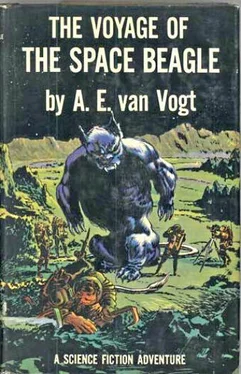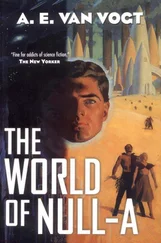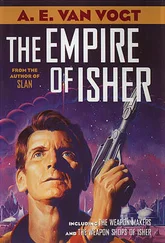Von Grossen blinked and sat up. “Was that evidence?” he asked in surprise. He turned in his seat, and faced his colleagues with a thoughtful frown. “I don’t see the significance,” he said, “but the molecules of air in the sample marked ‘After’ carried a slightly higher electric charge.”
It was the decisive moment. Grosvenor gazed down at the upturned faces of the scientists and waited for the light of understanding to come to at least one pair of eyes.
The men sat solid, puzzled expressions on their faces. One individual said finally, in a wry voice, “I suppose we’re expected to jump to the conclusion that we are dealing with a nebular-dust intelligence. That’s too much for me to swallow.” Grosvenor said nothing. The mental jump he wanted them to make was even more farfetched than that, though the difference was subtle. Already, the feeling of disappointment was strong in him. He began to stiffen himself for the next step.
Kent said sharply, “Come, come, Mr. Grosvenor. Explain yourself, and then we will make up our minds.”
Grosvenor began reluctantly. “Gentlemen, your failure to see the answer at this point is very disturbing to me. I foresee that we are going to have trouble. Consider my position. I had given you the available evidence, including a description of the experiments which led me to identify our enemy. It is already clear that my conclusions will be regarded as distinctly controversial. And yet, if I am right — I’m convinced of it — failure to take the action I have in mind will be disastrous for the human race and for all other intelligent life in the universe. But here is the situation: If I tell you, then the decision is out of my hands. The majority will decide, and there will be no legal recourse from their decision, so far as I can see.”
He paused to let that sink in. Some of the men glanced at each other, frowning. Kent said, “Wait, I have already come up against the stone wall of this man’s egotism.”
It was his first hostile comment of the meeting. Grosvenor glanced at him quickly, then turned away, and went on. “It is my unhappy lot to inform you, gentlemen, that under the circumstances, this problem ceases to be scientific and becomes political. Accordingly, I have to insist that my solution be accepted. A satisfactory propaganda must be launched, in which Acting Director Kent and every head of a department commits himself to the notion that the Space Beagle will have to remain in space the equivalent of five Earth years extra, though we should act as if it were five star years. I am going to give you my interpretation, but I want each head to adjust himself to the notion that he must irrevocably stake his reputation and good name on this matter. The danger, as I see it, is so all-embracing that any petty squabbling we do will be disgraceful according to the time we spend on it.”
Succinctly, he told them what the danger was. Then, without waiting for their reaction, he outlined his method of dealing with it.
“We’ll have to find some iron planets and set the productive capacity of our ship to the making of atomically unstable torpedoes. I foresee that we will have to spend nearly a year traversing this galaxy and sending out such torpedoes in great numbers at random. And then, when we have made this entire sector of space virtually untenable for him, we depart and offer him the opportunity of following us, this last at a time when he will have literally no recourse but to pursue our ship in the hope that we will lead him to another and better source of food than is available here. Most of our time will be taken up in making sure that we do not guide him back to our own galaxy.”
He paused, then said quietly, “Well, gentlemen, there you have it. I can see on various faces that the reaction is going to be a split one and that we are in for one of those deadly controversies.”
He stopped. There was silence, and then a man said, “Five years.”
It was almost a sigh, and it acted like a cue. All over the room, men stirred uneasily.
Grosvenor said quickly, “Earth years.”
He had to keep pressing that. He had deliberately chosen what seemed the longer way to estimating time, so that, when translated into star years, it would seem somewhat less. The fact was that Star Time, with its hundred-minute hour, its twenty-four hour day, and its three-hundred-and-sixty-day year, was a psychological device. Once adjusted to the longer day, people tended to forget how much time was passing according to their older ways of thinking.
In the same way, now, he expected them to feel relieved when they realized that the extra time would amount to just about three years, Star Time.
Kent was speaking: “Any other comments?”
Von Grossen said unhappily, “I cannot honestly accept Mr. Grosvenor’s analysis. I have great respect for him in view of his past performances. But he is asking us to take on faith what I am sure we could understand if he actually had valid evidence. I reject the notion that Nexialism provides so sharp an integration of sciences that only individuals trained by its methods can hope to understand the more intricate interrelated phenomena.”
Grosvenor said curtly, “Aren’t you rejecting rather hastily something which you have never troubled to investigate?” Von Grossen shrugged, “Perhaps.” “The picture I have,” said Zeller, “is of us spending many years and much effort, and yet not once will we have anything but the most indirect and insubstantial evidence that the plan is working.”
Grosvenor hesitated. Then he realized that he had no alternative but to continue to make antagonistic statements. The issue was too important. He could not consider their feelings. He said, “ I’ll know when we’ve been successful, and if some of you people will deign to come to the Nexial department and learn a few of our techniques, you’ll know it also when the time comes.”
Smith said grimly. “Mr. Grosvenor has this in his favour. He is always offering to teach us how to be his equal.”
“Any more comments?” It was Kent, his voice shriller, and edged with triumph.
Several men made as if to speak, but seemingly thought better of it. Kent went on, “Rather than waste any time, I think we should take a vote as to what the majority feels about Mr. Grosvenor’s proposal. I’m sure we all want to have a general reaction.”
He walked forward slowly. Grosvenor could not see his face, but there was arrogance in the way the man held himself. Kent said, “Let’s have a showing of hands. All in favour of accepting Mr. Grosvenor’s method — which involves remaining five extra years in space — please raise your hands.” Not a single hand came up.
A man said querulously, “It’ll take a little while to think this through.”
Kent paused to answer that. “We’re trying to get the as-of-now opinion. It’s important to all of us to know what the chief scientists of this ship think.”
He broke off, and called out, “Those definitely against, raise your hands!”
All except three hands came up. In a lightning glance, Grosvenor identified the three who had abstained. They were Korita, McCann, and von Grossen.
Belatedly, he saw that Captain Leeth, who stood near Kent, had also abstained.
Grosvenor said quickly, “Captain Leeth, this is surely a moment when your constitutional right to take control of the ship would apply. The danger is obvious.”
“Mr. Grosvenor,” said Captain Leeth slowly, “that would be true if there were a visible enemy. As it is, I can act only on the advice of the scientific experts.”
“There is only one such expert aboard,” said Grosvenor coldly. “The others are a handful of amateurs who dabble around on the surface of things.”
Читать дальше











